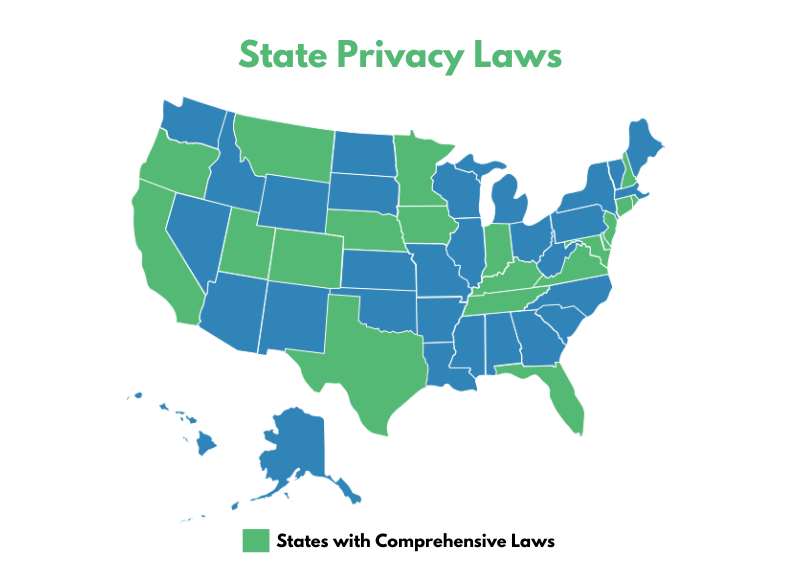
In today’s digital world, we are constantly connected. From ordering pizza in seconds, to attending classes online, technology has become a part of our daily lives. With every click, swipe, and interaction we are creating data about our habits, preferences, and personal lives. It’s a massive amount of information being produced.
The sheer volume, along with the desire to protect our privacy, shows the importance of understanding not just how data is generated and used, but also the rights we have to secure it. Newer technologies, like wearable devices and the Internet of Things (IoT), are changing the way we interact with technology, creating astonishing use cases we are just beginning to explore.
With all of this comes the exchange of even more information. Of course, our personal information follows us wherever we go, even when we travel across the United States. Without a federal data privacy law, our data is at risk because it’s treated differently by different laws as we cross state lines.
We need a federal data privacy law that protects all Americans equally, no matter where we live or travel within the United States.
The emergence of innovative technology isn’t slowing down either. The growth of artificial intelligence (AI) alone is staggering. Demandsage and Statista note that AI use across industries such as healthcare, manufacturing, and finance, among others, is expected to grow more than 20% annually for the next five years. This is just one example of the rapid expansion of data-driven technologies that, without a federal privacy law, leave many Americans’ data unprotected.
Currently, we have a stalemate in Congress and several failed attempts at creating a national standard. This has left a widening gap that states are filling with inconsistent protections, leading to unequal protection for Americans nationwide. Right now, 20 states across the country have enacted state-level privacy laws, compared to 17 states just last year. As more states take action to enact privacy laws, room for confusion and inconsistency grows, and questions are left unanswered.

States in alphabetical order: California, Colorado, Connecticut, Delaware, Florida, Indiana, Iowa, Kentucky, Maryland, Minnesota, Montana, Nebraska, New Hampshire, New Jersey, Oregon, Rhode Island, Tennessee, Texas, Utah, and Virginia
So regardless of where you live – and what law your state may or may not have – why should you care?
Data flows across state lines, but state laws stop at the border. Inconsistent laws could lead to misused data and privacy breaches. Further, complex, varying compliance guidelines not only create confusion but tie businesses’ hands, forcing extra costs to trickle down that we could ultimately absorb. We even risk slowing down digital innovation.
The case for a comprehensive federal privacy law that reflects the reality of the technological age has never been more urgent. As states continue to fill the gap, it’s clear that legislation at the federal level would increase Americans’ protections and create a cohesive national environment, fostering the growth of 5G innovation that enhances our lives.
While you take steps to protect your own data privacy, consider taking it a step further. Continue to educate yourself on all the reasons why we need a strong, comprehensive national privacy law.